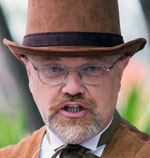By Eric George Tauber
 SAN DIEGO — In my review of “The Diary of Anne Frank” at the Moxie Theatre, I mentioned a boy who broke down in tears after the show. Probably, he didn’t know that Anne and Peter didn’t survive the war and, as a child about the same age, this made him feel especially vulnerable.
SAN DIEGO — In my review of “The Diary of Anne Frank” at the Moxie Theatre, I mentioned a boy who broke down in tears after the show. Probably, he didn’t know that Anne and Peter didn’t survive the war and, as a child about the same age, this made him feel especially vulnerable.
But what if she had survived? What kind of life would she have led? Would she have ever been able to get on with her life, or would the greater part of her have always felt trapped in that annex? These are questions explored by Playwright Alix Sobler in The Secret Annex performed as a completely cold, unrehearsed staged reading at the Moxie Theatre to benefit the work of The Nile Sisters. But more on them later.
It’s 1954. Now twenty-five and living in Brooklynn, Anne is an aspiring novelist, but she’s having trouble getting her diary published. Her fast-talking publisher says it doesn’t have enough “drama,” not like the battlefield or the camps. But with a “boffo-socko” rewrite as a work of fiction with changed names, maybe it will sell.
Like all immigrants, they’re having difficulty adjusting to life in the US. The language is new and many colloquial metaphors are rooted in baseball. You have to know the game to get the jokes. Plus, like the California Dream, real life in the Big Apple can never live up to the hype.
Like many creative types, Anne can still be pretty selfish, too absorbed in her own world to fully consider others. Anne and Peter’s feelings for each other are complicated. They love each other dearly, but they’re not together. Well, not … that way. Anne loves to play “I remember.” Of course she remembers, but Margot and Peter would rather forget and move forward.
My favorite moment was a rant from the publisher about her days in Catholic school. She asked the nuns how they could stay mad at the Jews for killing their boy, JC if God sent him to die for their sins? And didn’t he come back to life anyway?
“Not everything happens for a reason. But that doesn’t mean that life is without meaning.” –Alix Sobler
For most Shoah survivors, decades passed before they could write their books and tell their stories. So unbearable were the memories of that horror. But Sobler’s adult Anne lives there still. It’s all she can write about. Maybe her story needed a tragic ending in order to be told.
After the show, we met Elizabeth Lou, President and CEO of the Nile Sisters Development Initiative. Herself a former refugee from South Sudan, her organization’s mission is “to educate, support and offer training to refugee and immigrant women and their families to help them overcome barriers to social and economic self-reliance.” (www.nilesisters.org)
I’ve worked with the Sudanese population as an English tutor and heard their stories. Their heart-breaking trauma and quiet fortitude reminded me of Shoah survivors. We may say, “Never Again,” but the reality is that it happens over and over again. We may be powerless to stop all of the world’s evils, but we can always have a heart for those in need.
*
Tauber is a freelance writer who specializes in coverage of the arts. He may be contacted via eric.tauber@sdjewishworld.com
Hello. I just had to write. My mother-in-law and her older sister survived Aushwitz and Belsen. Years later she saw Ann Frank’s picture in some publicity for the book. She recognized Ann as another person with an older sister in the camps. My mother-in-law said one time Ann had gotten ahold of an orange, and my mother-in-law was so jealous. They weren’t friends; she just knew who she was My mother-in-law and her sister were deathly ill with typhus and barely survived, but they did. She went on to live in a DP camp for many years, then met her husband, had a baby, then came to Louisville, KY as that Jewish community sponsored them. She went on to have 4 more children—but lost her husband due to him having been beaten in the camps and ruining his kidneys. She joined her brother who had also survived in Australia for a year, went to Hawaii for a year to start a business. Then came to L.A. where she met her second husband. She always had to work during these years to support her two children. With her 2nd husband, she had 3 more children. She lived until 91–always haunted by her many losses and terrible experiences. Not sure how Ann would have done, but my mother-in-law is one example of a survivor’s life.